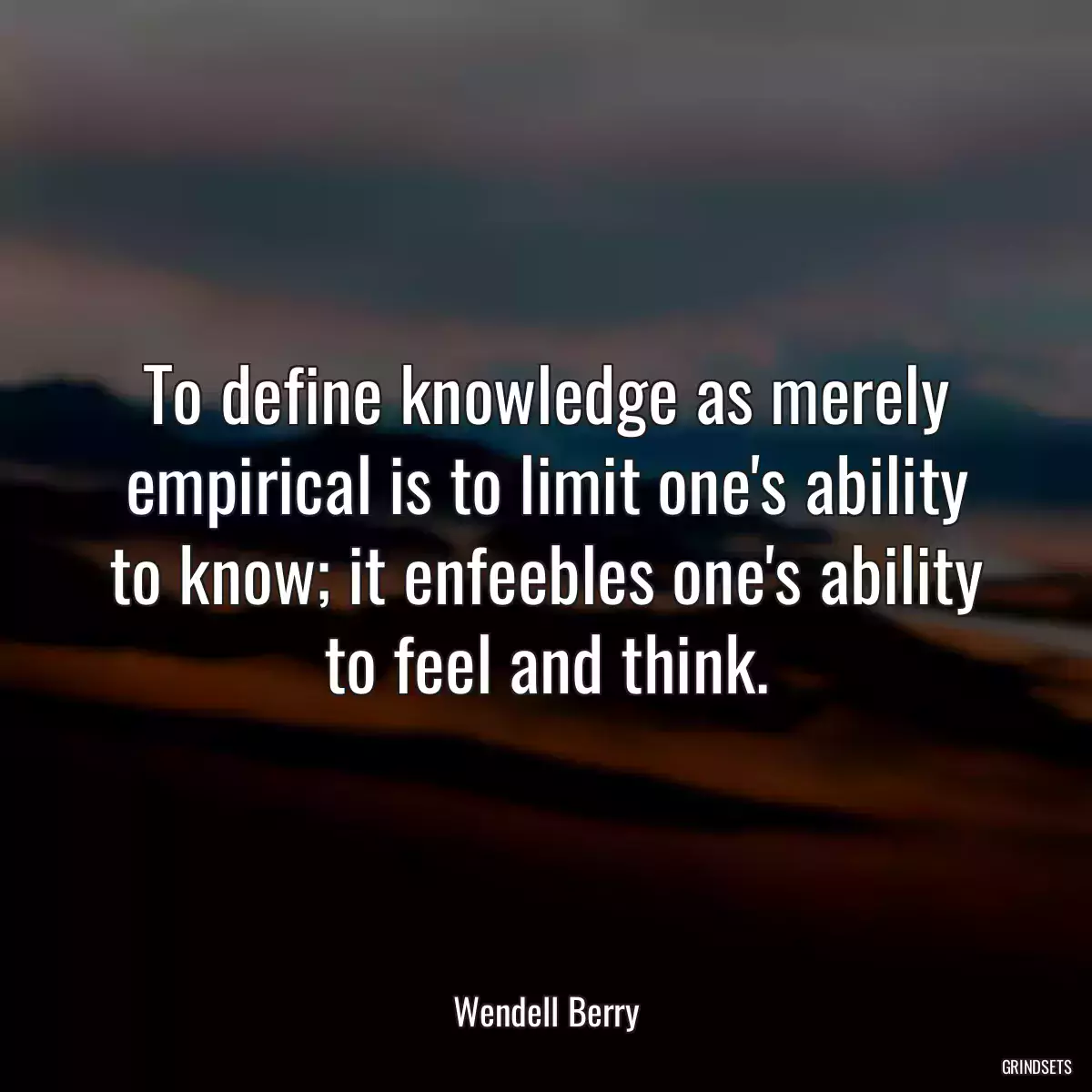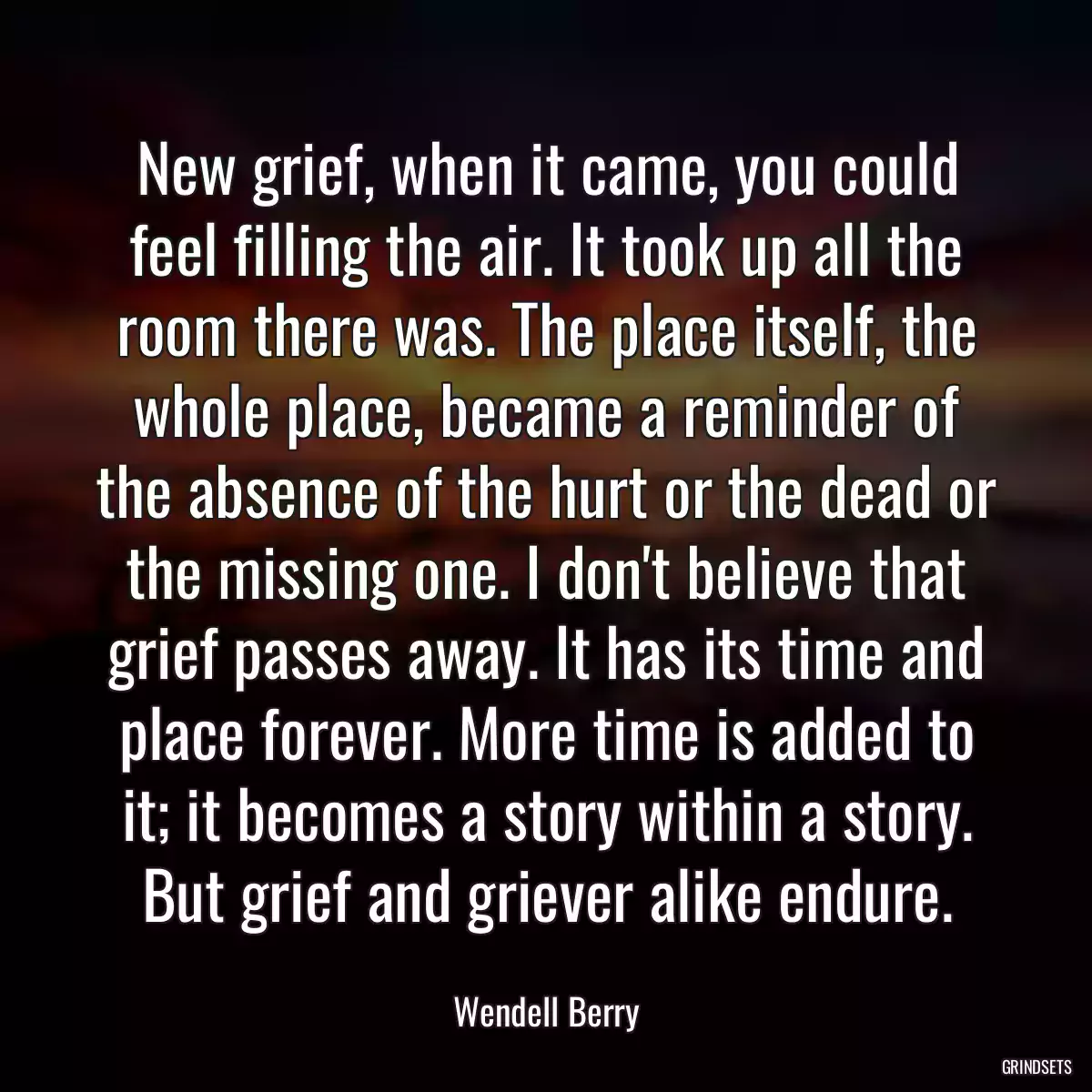
Quotes Wendell Berry
Find dozens of Wendell Berry with images to copy and share.

We must learn to acknowledge that the creation is full of mystery; we will never entirely understand it. We must abandon arrogance and stand in awe. We must recover the sense of the majesty of creation, and the ability to be worshipful in its presence. For I do not doubt that it is only on the condition of humility and reverence before the world that our species will be able to remain in it.
Geese appear high over us, / pass, and the sky closes. Abandon, / as in love or sleep, holds them to their way, clear / in the ancient faith: what we need / is here. And we pray, not / for new earth or heaven, but to be / quiet in heart, and in eye, / clear. What we need is here.
I'd rather rely on mother nature's wisdom than man's cleverness
You may also like
The earth is what we all have in common.
To be well used, creatures and places must be used sympathetically, just as they must be known sympathetically to be well known...The "animal scientist" to whom it is of no concern whether or not animals suffer will almost inevitably aid and abet the destruction of the decent old ideal of animal husbandry and, as a consequence, increase the suffering of animals. I hope that my country may be delivered from the remote, cold abstractions of university science.
To think better, to think like the best humans, we are probably going to have to learn again to judge a person's intelligence, not by the ability to recite facts, but by the good order or harmoniousness of his or her surroundings. We must suspect that any statistical justification of ugliness and violence is a revelation of stupidity. (pg.192-193, People, Land, and Community)
The ability to speak exactly is intimately related to the ability to know exactly.
The issue here really is not whether international trade shall be free but whether or not it makes any sense for a country - or, for that matter, a region - to destroy its own capacity to produce its own food. How can a government, entrusted with the safety and health of its people, conscientiously barter away in the name of an economic idea that people's ability to feed itself? And if people lose their ability to feed themselves, how can they be said to be free?

In order to survive, a plurality of true communities would require not egalitarianism and tolerance but knowledge, an understanding of the necessity of local differences, and respect. Respect, I think, always implies imagination - the ability to see one another, across our inevitable differences, as living souls.
A person who undertakes to grow a garden at home, by practices that will preserve rather than exploit the economy of the soil, has his mind precisely against what is wrong with us... What I am saying is that if we apply our minds directly and competently to the needs of the earth, then we will have begun to make fundamental and necessary changes in our minds. We will begin to understand and to mistrust and to change our wasteful economy, which markets not just the produce of earth, but also the earth's ability to produce.
You have to be able to imagine lives that are not yours.
Supporters of the war are constantly asking those who oppose it: Why don't you deplore the wrongs and atrocities committed by the other side? The answer, so far as I am concerned, is that I do deplore the wrongs and atrocities committed by the other side. But I am responsible for the wrongs and atrocities committed by our side. And I am no longer able to participate in the assumption that atrocities committed by remote control are less objectionable than those committed at arm's length. I am most concerned with American obstacles to peace because I am an American.
We can say without exaggeration that the present national ambition of the United States is unemployment. People live for quitting time, for weekends, for vacations, and for retirement; moreover, this ambition seems to be classless, as true in the executive suites as on the assembly lines. One works not because the work is necessary, valuable, useful to a desirable end, or because one loves to do it, but only to be able to quit - a condition that a saner time would regard as infernal, a condemnation.
As long as we insist on relating to it strictly on our own terms-as strange to us or subject to us-the wilderness is alien, threatening, fearful. We have no choice then but to become its exploiters, and to lose, by consequence, our place in it. It is only when, by humility, openness, generosity, courage, we make ourselves able to relate to it on its terms that it ceases to be alien.
It is only on the condition of humility and reverence before the world that our species will be able to remain in it.
I began to know my story then. Like everybody's, it was going to be the story of living in the absence of the dead. What is the thread that holds it all together? Grief, I thought for a while. And grief is there sure enough, just about all the way through. From the time I was a girl I have never been far from it. But grief is not a force and has no power to hold. You only bear it. Love is what carries you, for it is always there, even in the dark, or most in the dark, but shining out at times like gold stitches in a piece of embroidery.
You may also like

New grief, when it came, you could feel filling the air. It took up all the room there was. The place itself, the whole place, became a reminder of the absence of the hurt or the dead or the missing one. I don't believe that grief passes away. It has its time and place forever. More time is added to it; it becomes a story within a story. But grief and griever alike endure.
There are two laws that we had better take to be absolute. The first is that as we cannot exempt ourselves from living in this world, then if we wish to live, we cannot exempt ourselves from using the world. If we cannot exempt ourselves from use, then we must deal with the issues raised by use. And so the second law is that if we want to continue living, we cannot exempt use from care.